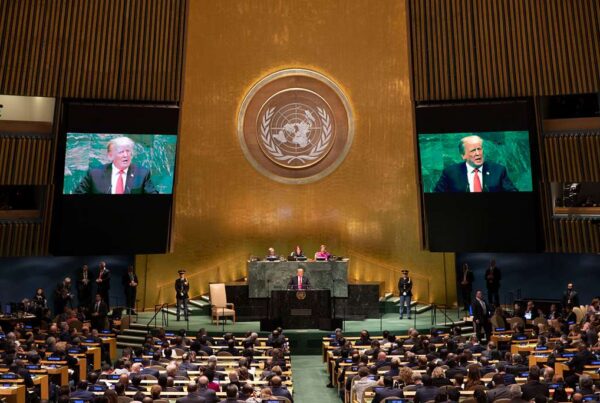Israel remains at the forefront of an existential battle, facing the grim realities of war while demonstrating remarkable resilience. In this moment of crisis, Daniel Rosen, President of the American Jewish Congress, visited Israel to stand in solidarity, meet with its leadership, and grasp the nation’s fortitude firsthand. This journey was not only emotional but also deeply informative. While Israel’s resilience is unwavering, its greatest goal remains the return of every hostage. Through the visit, he gained crucial insights into how Israel is coping with the aftermath of the unprecedented seven-front war launched by Iran and its proxies, including Hamas, Hezbollah, and the Houthis.
A Meeting With Israel’s President: A Bond Reaffirmed.
President Isaac Herzog
Among the pivotal moments of Rosen’s visit was his meeting with Israeli President Isaac Herzog. In a gesture of historical significance, Rosen presented President Herzog with a framed copy of a speech delivered by his father, then-President Chaim Herzog, at an American Jewish Congress event in 1996. The gesture reinforced the long-standing connection between the American Jewish Congress and Israel. Rosen assured President Herzog of the strong bipartisan consensus in America supporting Israel’s efforts to bring every hostage home from Gaza. Israel’s President expressed a deep interest in AJCongress’ century-long legacy of fostering community relations in America and discussed with Rosen the importance of strengthening these ties amid rising antisemitism following October 7.
A Meeting With Israel’s Top Diplomat.
On the challenges of wartime diplomacy, Rosen met with Israel’s Minister of Foreign Affairs, Gideon Saar, to discuss the evolving landscape of Israeli foreign relations. While Israel has long navigated the complexities of coalition-building and overcoming hostility, the aftermath of October 7 presented a unique shift. Overnight, Israel moved from expanding regional normalization and economic integration to recalling ambassadors from partner Arab states, both for consultations and to safeguard its diplomats from rising threats. The meeting also provided an opportunity for Rosen to share insights from the American Jewish Congress’ extensive work with media and influencers in the Gulf region and Pakistan during critical moments of the war in Gaza throughout 2024. Rosen and Saar agreed that no mission is more urgent than bringing every hostage home from Gaza.
Foreign Minister Gideon Saar
Unwavering Resilience, Unfinished Mission: Bringing Every Hostage Home.
Among the most profound encounters of the trip was Daniel and Carolyn Rosen’s meeting with Luis Har, one of the hostages rescued from Hamas captivity in February 2024 by the Israel Defense Forces (IDF). His harrowing account brought the war’s human toll into sharp focus. Har spent 129 days in captivity in Gaza, the first 53 of which he was held with other family members until they were released in a hostage exchange. He recounted to the Rosens how, after being taken into a tunnel in Gaza, Hamas terrorists forced him and his family to run from Khan Younis to Rafah—a distance of approximately 8 to 10 kilometers (5 to 6 miles). Har’s account of captivity, survival, and the emotional aftermath underscored the urgency of Israel’s mission to secure the release of all remaining hostages.

Hostage Survivor Luis Har with Daniel and Carolyn Rosen

Conversations With Key Political Leaders.
Throughout his visit, Rosen engaged with an array of influential Israeli political figures, each offering a unique perspective on the country’s challenges and strategies for the future. He met with Yair Lapid, the former Prime Minister and current leader of the opposition, who has been a vocal advocate for maintaining Israel’s democratic values during wartime. Benny Gantz, a former Minister of Defense and a key figure in Israel’s security apparatus, provided a critical assessment of Israel’s military response and the need for continued global support. Both Lapid and Gantz assured Rosen that the hostages’ return is a national mission that transcends politics and war.
Former Prime Minister & Opposition Leader Yair Lapid
Former Minister of Defense Benny Gantz
Other significant meetings included discussions with Avigdor Lieberman, former Minister of Foreign Affairs and Defense, who shared insights on Israel’s diplomatic strategies and its relations with Arab neighbors. Rosen also met with Yair Golan, the head of the Labor Party, and Mickey Levy, former Speaker of the Knesset, the Israeli parliament. Despite diverging views on almost everything, Lieberman, Golan, and Levy were clear-headed on Israel’s most pressing concern. Until every hostage is returned, Israel’s fight remains unfinished. These meetings helped deepen Rosen’s understanding of the political landscape and the broad bipartisan commitment to national security.

Former Minister of Foreign Affairs and Defense Avigdor Lieberman

Head of the Labor Party Yair Golan
Former Speaker of Knesset Mickey Levy
Understanding The Arab-Israeli Perspective.
A particularly noteworthy meeting was with Member of Knesset (M.K.) Mansour Abbas, a prominent Arab-Muslim Israeli leader. Their discussion offered valuable insight into how Israel’s Arab citizens have responded to the war, especially given that Hamas’ attacks did not spare Arab-Israelis. Contrary to common perceptions, support for Israel’s defense efforts among Arab-Israelis has been significant, driven by outrage over Hamas’ indiscriminate brutality against all Israeli civilians—Arabs and Jews alike. Rosen and Abbas agreed that the safe return of the hostages is not just a priority—it is a moral imperative. Rosen and Abbas explored the robust inclusivity of Israeli society and the shared resolve against terrorism, offering a fresh appreciation for diversity and unity within Israel.

Arab-Israeli Member of Knesset Mansour Abbas, who is MuslimArab-Israeli Member of Knesset Mansour Abbas, who is Muslim
Western Allies And Arab Partners.
Rosen also held an important discussion with Tzipi Livni, Israel’s former Minister of Foreign Affairs and a prominent advocate for diplomatic engagement and regional peace. Livni, known for her role in past peace negotiations, shared her perspective on the long-term diplomatic challenges Israel faces and the importance of maintaining strong ties with Western allies. Yet she underscored there should be no ambiguity about the centrality of the return of hostages. Bringing the hostages home is not just a goal—it is Israel’s most pressing duty.
Former Minister of Foreign Affairs Tzipi Livni
Hostages Square in Tel Aviv: Turning Pain Into Purpose.
During his visit, Rosen toured Hostages Square in Tel Aviv, where he was profoundly moved by the raw emotion and unyielding determination of the families and citizens gathered there. Standing among those who have turned their grief into a relentless call for action, he was struck by the sheer force of Israeli unity and the unwavering demand for justice. The Square, filled with photos of the missing, hand-written pleas, and burning candles, was not just a protest site—it was a living testament to Israel’s resilience [See Rosen’s short clip]. Rosen saw firsthand how this grassroots movement had become an unshakable moral force, shaping public discourse and pressuring leaders to keep the hostages’ plight at the forefront. The experience left a deep imprint on him, reinforcing his appreciation for Israel’s democratic spirit and the power of its people to turn pain into purpose.
A screenshot from a short clip that captures the emotions that a visitor to the Hostages Square in Tel Aviv might experience.
Bearing Witness To Tragedy: The Nova Festival Massacre Site.
One of the most emotional moments of the visit was Rosen’s tour of the Nova music festival massacre site, where Hamas terrorists brutally slaughtered hundreds of young festivalgoers on October 7, 2023. Walking through the remnants of what was once a vibrant celebration of music and unity, Rosen witnessed firsthand the devastating impact of Hamas’ savagery. The following brief clip captures a powerful moment from his visit, showing him walking through the very space where young revelers once danced—right in front of the DJ booth where music once played. This encapsulates the overwhelming emotions of the visit, a stark reminder of both the tragedy and the resilience of those who put together this poignant monument to the lives lost.
Daniel Rosen is standing in the place where some of the bodies of the Nova music festival revelers were found.
Kibbutz Be’eri: A Community In Mourning And Rebuilding.
Rosen, accompanied by his wife, Carolyn Rosen, also visited Kibbutz Be’eri, one of the hardest-hit communities in the October 7 attacks. Hamas terrorists mercilessly slaughtered entire families, killing 101 residents and leaving behind shattered homes and broken hearts. Yet, even in the face of such devastation, the spirit of resilience endures. The kibbutz is rebuilding—a testament to Israel’s unbreakable will to survive and thrive despite relentless threats. To offer a glimpse into the tragedy that unfolded, this brief clip takes you inside one of the homes where Hamas terrorists carried out their brutal attack, as Rosen and his entourage pass through its haunting remains.

Daniel and Carolyn Rosen in front of a house at Kibbutz Be’eri. Pictures of the two residents killed here by Hamas terrorists are visible on the hanging banners.
This brief clip takes you inside one of the homes where Hamas terrorists carried out their brutal attack.
The Role of the American Jewish Congress.
Since Hamas’ horrific invasion and massacre in Israel, the American Jewish Congress has been a steadfast advocate for Israel’s right to self-defense. To provide critical context to Israel’s difficult but necessary military responses, AJCongress launched the Israel Under Attack newsletter, which has played a key role in explaining why Israel must fight against enemies’ intent on its destruction. This commitment to unequivocally support Israel’s right to defend itself has been guided by a powerful principle that shapes AJCongress advocacy in the aftermath of October 7: “War Is Bad, But Good Things Happen When Evil Is Defeated.”
A Visit That Strengthens Commitment.
Daniel Rosen’s visit to Israel was more than a diplomatic mission—it was a reaffirmation of unwavering support for a nation under siege, fighting on seven fronts against enemies determined to kill its citizens. Through his meetings with Israeli leaders, survivors, and ordinary citizens, Rosen gained a deeper understanding of Israel’s resilience, the strength of its economy even in wartime, and the critical role of regional diplomacy.
As Israel continues its fight for security and survival, the American Jewish Congress remains steadfast in its mission. Through advocacy, education, and direct engagement, AJCongress ensures that the American public and policymakers remain informed about Israel’s struggle and the necessity of its self-defense.
Israel does not stand alone. Thanks to the tireless efforts of AJCongress and its supporters, its voice continues to be heard loud and clear.
Israel’s strength endures, but its true victory lies in the return of every hostage.
Now, more than ever, standing with Israel matters.















